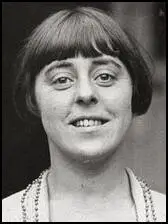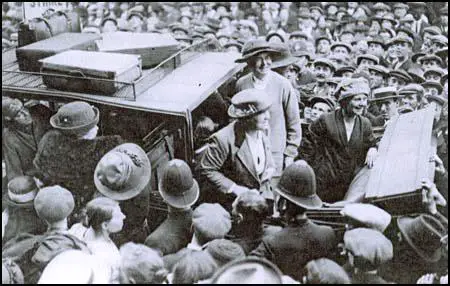Minnie Lansbury

Minnie Glassman, the daughter of Jewish coal merchant Isaac Glassman, was born in Stepney in 1889. She became a school teacher and was active in the campaign for women's suffrage.
In 1913, Sylvia Pankhurst, with the help of Millie Glassman, Julia Scurr, Keir Hardie and George Lansbury, established the East London Federation of Suffragettes (ELF). An organisation that combined socialism with a demand for women's suffrage it worked closely with the Independent Labour Party.
As June Hannam has pointed out: "The East London Federation of Suffragettes was successful in gaining support from working women and also from dock workers. The ELF organized suffrage demonstrations and its members carried out acts of militancy."
In 1914 Millie married Edgar Lansbury, the son of George Lansbury, the Labour Party MP for Bow & Bromley. Millie was a pacifist and opposed the First World War. In March 1916 Sylvia Pankhurst renamed the East London Federation of Suffragettes, the Workers' Suffrage Federation (WSF). The newspaper was renamed the Workers' Dreadnought and continued to campaign against the war and gave strong support to organizations such as the Non-Conscription Fellowship. In 1918 Millie was elected Assistant Secretary of the Workers' Socialist Federation.
In November 1919 Millie Lansbury was elected to Poplar Council. The Labour Party had won 39 of the 42 council seats. In 1921 Poplar had a rateable value of £4m and 86,500 unemployed to support. Whereas other more prosperous councils could call on a rateable value of £15 to support only 4,800 jobless. George Lansbury proposed that the Council stop collecting the rates for outside, cross-London bodies. This was agreed and on 31st March 1921, Poplar Council set a rate of 4s 4d instead of 6s 10d. On 29th the Councillors were summoned to Court. They were told that they had to pay the rates or go to prison. At one meeting Millie said: "I wish the Government joy in its efforts to get this money from the people of Poplar. Poplar will pay its share of London's rates when Westminster, Kensington, and the City do the same."
On 28th August over 4,000 people held a demonstration at Tower Hill. The banner at the front of the march declared that "Popular Borough Councillors are still determined to go to prison to secure equalisation of rates for the poor Boroughs." The Councillors were arrested on 1st September. Five women Councillors, including Millie Lansbury, Julia Scurr and Susan Lawrence, were sent to Holloway Prison. Twenty-five men, including George Lansbury and John Scurr, went to Brixton Prison. On 21st September, public pressure led the government to release Nellie Cressall, who was six months pregnant. Julia Scurr reported that the "food was unfit for any human being... fish was given on Friday, they told us, that it was uneatable, in fact, it was in an advanced state of decomposition".

Jeannie MacKay, Susan Lawrence and Nellie Cressall.
Instead of acting as a deterrent to other minded councils, several Metropolitan Borough Councils announced their attention to follow Poplar's example. The government led by Stanley Baldwin and the London County Council was forced to back down and on 12th October, the Councillors were set free. The Councillors issued a statement that said: "We leave prison as free men and women, pledged only to attend a conference with all parties concerned in the dispute with us about rates... We feel our imprisonment has been well worth while, and none of us would have done otherwise than we did. We have forced public attention on the question of London rates, and have materially assisted in forcing the Government to call Parliament to deal with unemployment."
While in Holloway Prison Minnie Lansbury developed pneumonia and she died on 1st January 1922. According to Janine Booth she had told friends " that imprisonment had weakened her physically, leaving her body unable to fight off the illness that killed her." Her father-in-law, George Lansbury said: "Minnie, in her 32 years, crammed double that number of years' work compared with what many of us are able to accomplish. Her glory lies in the fact that with all her gifts and talents one thought dominated her whole being night and day: How shall we help the poor, the weak, the fallen, weary and heavy-laden, to help themselves? When, a soldier like Minnie passes on, it only means their presence is withdrawn, their life and work remaining an inspiration and a call to us each to close the ranks and continue our march breast forward."
Primary Sources
(1) George Lansbury, Daily Herald (5th January, 1922)
Minnie, in her 32 years, crammed double that number of years' work compared with what many of us are able to accomplish. Her glory lies in the fact that with all her gifts and talents one thought dominated her whole being night and day: How shall we help the poor, the weak, the fallen, weary and heavy-laden, to help themselves?
When, a soldier like Minnie passes on, it only means their presence is withdrawn, their life and work remaining an inspiration and a call to us each to close the ranks and continue our march breast forward.
(2) Janine Booth, Guilty and Proud of It! Poplar's Rebel Councillors and Guardians 1919-25 (2009)
On the very first day of 1922, Poplar's labour movement suffered a personal and political tragedy with the death of Minnie Lansbury from influenza and pneumonia. That evening, Charlie Sumner announced Minnie's death to a thousand-strong meeting at Bow Baths: "The audience for a moment was stricken silent ... Then out of the silence came a woman's cry of grief, followed by the weeping of many women." After a few minutes' standing tribute, the meeting was abandoned.
Aged 32, Minnie was the youngest of the jailed councillors. Councillor Joe Banks wrote that "The movement has lost a valuable member whose place it will be hard to fill", Councillor Thomas Blacketer that "Our loss is irreplaceable". Minnie, he said, had "died for the cause", arguing that imprisonment had weakened her physically, leaving her body unable to fight off the illness that killed her.
On January 4, a crowd of thousands, mainly women, gathered outside Minnie's house to march to her funeral in tribute - the same house at which she had held a daily surgery at 9 a.m. during her years of involvement in the council and the community. Four of her fellow councillors bore her coffin on their shoulders' preceded by the Shenfield Boys' Band and followed by 500 local unemployed at the head of a vast procession and cars full of floral tributes from Labour Party, Communist Party and trade union branches. At the crematorium's', Reverend Kitcat told of Minnie Lansbury's three great qualities: "her intellectual power... her extraordinary liberal mind and generosity of disposition... and her love of justice, and depth of her sympathy, for suffering and sorrow. Mourners wearing red flowers and badges sang The Red Flag. A local newspaper wrote, "Cut off in the midst of her social and municipal activities, with only a few days warning, the tragic suddenness of Alderman Mrs Lansbury's death has made a profound impression on her many friends in Poplar."

